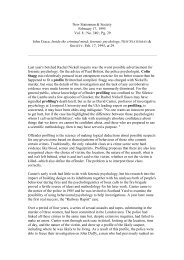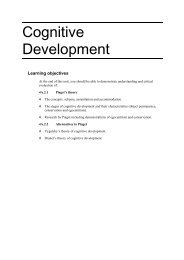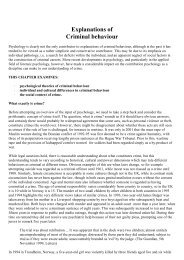Ch 11 - Jeff Standen
Ch 11 - Jeff Standen
Ch 11 - Jeff Standen
You also want an ePaper? Increase the reach of your titles
YUMPU automatically turns print PDFs into web optimized ePapers that Google loves.
odels of<br />
abnormality<br />
This often involves a life change. For example,<br />
unemployment and retirement can lead to a loss of positive<br />
reinforcement - a loss of rewarding social relationships and<br />
reduced status and income. Life changes can also lead to<br />
unpleasant experiences such as the shame and stigma of<br />
unemployment or, in the case of retirement, being treated in<br />
terms of the negative stereotypes of old age.<br />
Research by Lewinsohn et al. (1979) showed that<br />
depressed people received fewer positive reinforcements<br />
and are likely to have more unpleasant experiences than<br />
nondepressed people. The researchers found that a lack of<br />
positive social reinforcement - the approval and<br />
companionship of others - was particularly important.<br />
|[ Treatment and the behavioural model<br />
According to the behavioural model, the problem is the<br />
behaviour and treatment - behaviour therapy - involves<br />
modifying or changing that behaviour. The idea of 'mental'<br />
or 'psychological disorder' is replaced by the idea of<br />
inappropriate or maladaptive behaviour. A behavioural<br />
therapist is more like a teacher than a doctor - their role is to<br />
teach new behaviours rather than to cure mental illnesses.<br />
Classical conditioning Behaviour therapies based on<br />
classical conditioning include systematic desensitisation<br />
and aversion therapy. Systematic desensitisation (Wolpe,<br />
1958) is used for deconditioning phobic fears. A phobia<br />
arises when something harmless has become associated<br />
with something frightening. In the Little Albert study, a<br />
white rat became associated with a frightening noise until<br />
the rat itself became an object of fear. In systematic<br />
desensitisation, the client is taught to relax and confront the<br />
feared object or situation in a calm and peaceful setting.<br />
The idea is that the object of fear will become associated<br />
with a pleasant feeling of relaxation and calm, and lose its<br />
frightening associations.<br />
Aversion therapy is often used for treating addictions. It<br />
aims to change maladaptive behaviour by associating it with<br />
something unpleasant. For example, a client may be given<br />
an electric shock or a nausea (sickness) inducing drug<br />
whenever they reach for a cigarette. In this case, the idea is<br />
that they will associate unpleasant feelings with cigarettes<br />
and stop smoking.<br />
Operant conditioning In behaviour modification<br />
programmes based on operant conditioning, the therapist<br />
rewards adaptive behaviour and withholds rewards from<br />
maladaptive behaviour. The idea is to change behaviour by<br />
applying reinforcement. An approach known as a token<br />
economy is based on this idea. It is sometimes used in<br />
schools, prisons and mental hospitals to change behaviour.<br />
Behaviour seen as appropriate is rewarded with tokens<br />
which can be exchanged for privileges such as longer<br />
breaks, sweets, or a movie. Tokens are withheld when<br />
behaviour is seen as inappropriate.<br />
Evaluation of the behavioural model<br />
Like the psychodynamic model, the behavioural approach is<br />
critical of the biological model. It rejects the view that<br />
normality and abnormality are sharply distinct. All<br />
behaviours are acquired in the same way. It rejects the idea<br />
that psychological disorders arise from underlying brain<br />
dysfunctions and biochemical imbalances. All disorders are<br />
maladaptive behaviours, arising from conditioning. It firmly<br />
rejects any role for inheritance in abnormality.<br />
However, the behavioural approach is also very critical of<br />
the psychodynamic model, with its emphasis on concepts<br />
like the Id, Ego and Superego, and processes like repression.<br />
According to the behaviourists, all of these are unobservable<br />
and unmeasurable.<br />
A scientific approach? Behaviourists claim that their<br />
approach is scientific - they focus exclusively on behaviour<br />
that can be directly observed and measured. Behaviourists<br />
claim support from a vast range of evidence from laboratory<br />
experiments.<br />
Reductionist, determinist and demeaning? Behaviourists<br />
have been criticised for what many see as a simplistic and<br />
narrow view of human behaviour. Can all human behaviour<br />
be reduced to learning by association and reinforcement?<br />
Behaviourism is an entirely deterministic account of human<br />
behaviour. But are we really the prisoners of our<br />
conditioning? Much of the laboratory evidence for<br />
behaviourism comes from studies of non-human animals.<br />
How far can experiments on rats apply to human beings?<br />
Critics argue that a model which leaves out thoughts,<br />
r<br />
Key terms<br />
Classical conditioning A form of learning based on an<br />
association between two stimuli.<br />
Operant conditioning A form of learning based on the use of<br />
reinforcement.<br />
Positive reinforcement The encouragement of behaviours by<br />
means of rewards.<br />
Negative reinforcement The encouragement of behaviours by<br />
removing unpleasant events when those behaviours occur.<br />
Systematic desensitisation Confronting feared objects or<br />
situations in a calm and relaxed setting and associating these<br />
feelings with them.<br />
Aversion therapy A technique which aims to change<br />
maladaptive behaviour by associating it with something<br />
unpleasant.<br />
Token economy A technique which reinforces appropriate<br />
behaviour.by giving or withholding tokens which can be<br />
exchanged for privileges.<br />
mm<br />
•P9H







